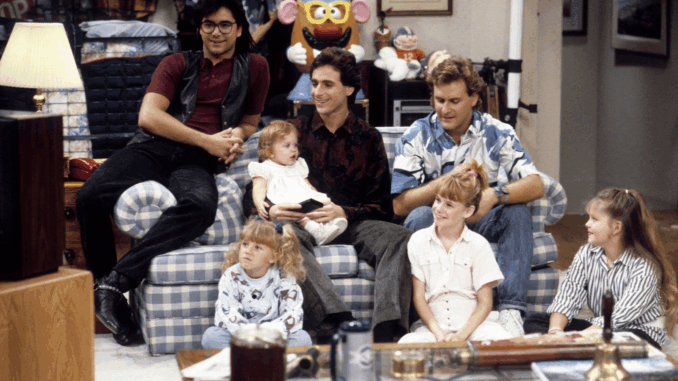
Full House is often remembered as one of the most wholesome, heartwarming sitcoms of the ’80s and ’90s. Yet, despite its popularity, some fans admit they were left disappointed — particularly by the later seasons and the finale.
So, what went wrong? Let’s explore why a show that once felt perfect didn’t always meet fan expectations.
The Early Magic of Full House
At its peak, Full House was pure family TV magic.
-
Heartfelt storylines
-
Life lessons for kids and parents
-
The perfect blend of humor and warmth
Viewers loved watching Danny Tanner, Uncle Jesse, and the Tanner kids navigate everyday life with laughter and love.
But over time, the show’s tone began to shift.
Overly Predictable Storylines
One common complaint was that episodes became formulaic.
Each week, a problem would appear, chaos would ensue, and everything would magically resolve by the end.
Fans who grew up with the show wanted deeper stories, more character growth, and challenges that felt realistic — not just “problem of the week” scenarios.
Steve Urkel… Wait, Wrong Show! But There Were Similar Gimmicks
While Family Matters had Urkel, Full House introduced its own over-the-top situations.
From outrageous stunts by Uncle Jesse to wacky misunderstandings, some viewers felt the show relied too heavily on exaggerated comedy rather than heartfelt storytelling.
For certain fans, the balance between humor and sincerity shifted too far toward the silly.
The Olsen Twins Controversy
Mary-Kate and Ashley Olsen shared the role of Michelle Tanner.
Fans loved Michelle’s adorable antics, but behind the scenes, the heavy filming schedule reportedly stressed the twins. Later in life, some viewers felt the show exploited child labor in a way that left a bittersweet taste.
Character Growth Stagnation
Another source of disappointment was how slowly characters developed.
-
D.J. remained cautious and shy for many seasons
-
Stephanie’s rebellious streak never matured fully
-
Uncle Jesse’s womanizing and antics felt repetitive
Fans expected characters to grow in realistic ways, but often, storylines reset each week.
The Focus Shift in Later Seasons
As the show progressed, Full House leaned more into comedy gimmicks and less into family-centered stories.
Viewers noticed that emotional depth sometimes took a backseat to slapstick and physical humor.
The early heartwarming messages became less frequent, which left some fans longing for the original tone.
The Finale That Left Questions
The final episode in 1995 wrapped up with plenty of hugs and smiles but lacked closure in some areas.
Fans wanted more insight into:
-
Michelle’s future
-
The kids’ long-term growth
-
Uncle Jesse’s relationship with Rebecca
Instead, the finale felt rushed and slightly superficial compared to expectations built over eight years.
Nostalgia vs. Reality
For some viewers, disappointment stems from nostalgia.
Full House holds a near-perfect place in memory, but rewatching the later seasons can reveal inconsistencies, plot repetition, and forced humor.
Fans often feel conflicted — loving the show but noticing its flaws.
Cast Changes and Behind-the-Scenes Tensions
As with any long-running show, cast members grew up and pursued other opportunities.
Mary-Kate and Ashley’s limited availability, combined with the adult actors’ other projects, occasionally impacted storyline quality.
Fans also speculate that creative differences behind the scenes may have influenced the show’s later seasons.
Comparisons with Reboots
Fuller House, the Netflix reboot, gave fans a modern look at the Tanner family.
While nostalgic, some viewers criticized it for leaning too much on old jokes and failing to capture the original charm.
This reinforced the idea that even beloved shows can disappoint when expectations are sky-high.
Why Fans Still Love Full House Despite Flaws
Even with these criticisms, Full House remains iconic.
Fans continue to watch reruns, quote catchphrases, and celebrate holiday specials.
The disappointment often coexists with affection — a reminder that even imperfect shows can leave lasting memories.
Lessons From Full House’s Disappointments
What can we learn from fan reactions?
-
Balance humor with depth
-
Let characters evolve naturally
-
Respect audience intelligence
-
Recognize that nostalgia shapes expectations
Even the most beloved shows face scrutiny — and Full House is no exception.
Conclusion
Some fans say Full House disappointed them, especially in later seasons and the finale.
But these criticisms don’t erase the laughter, lessons, and love the show brought into homes.
In the end, Full House remains a cultural touchstone, showing that even beloved shows have imperfections — yet still matter in the hearts of viewers.
FAQs
1. Why did some fans dislike later seasons of Full House?
Because storylines became predictable, comedic gimmicks replaced heartfelt moments, and character growth stagnated.
2. Was the finale disappointing?
Yes, for some fans it felt rushed and left key questions about characters unanswered.
3. Did cast changes affect the show?
Limited availability of the Olsen twins and adult actors pursuing other projects impacted story quality at times.
4. How does Full House compare to Fuller House?
While nostalgic, Fuller House was criticized for relying too heavily on old jokes and not capturing the original charm.
5. Does disappointment mean the show isn’t loved?
Not at all — fans still cherish the humor, lessons, and warmth of Full House despite noticing its flaws.
